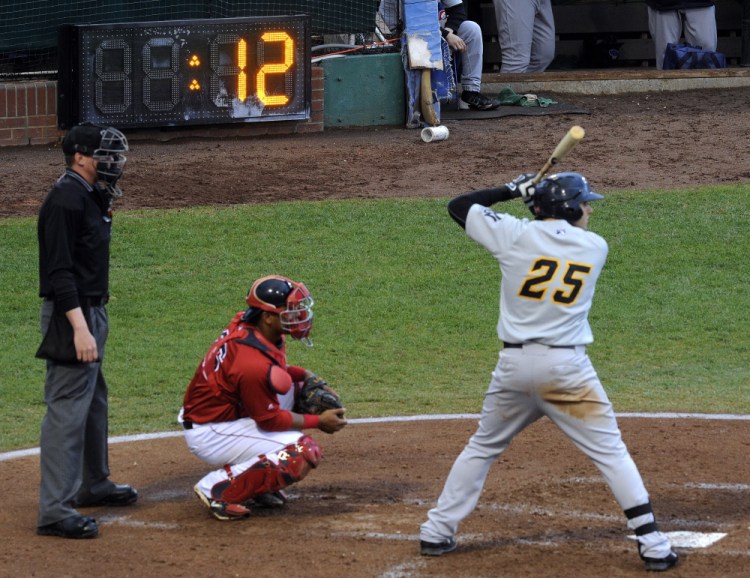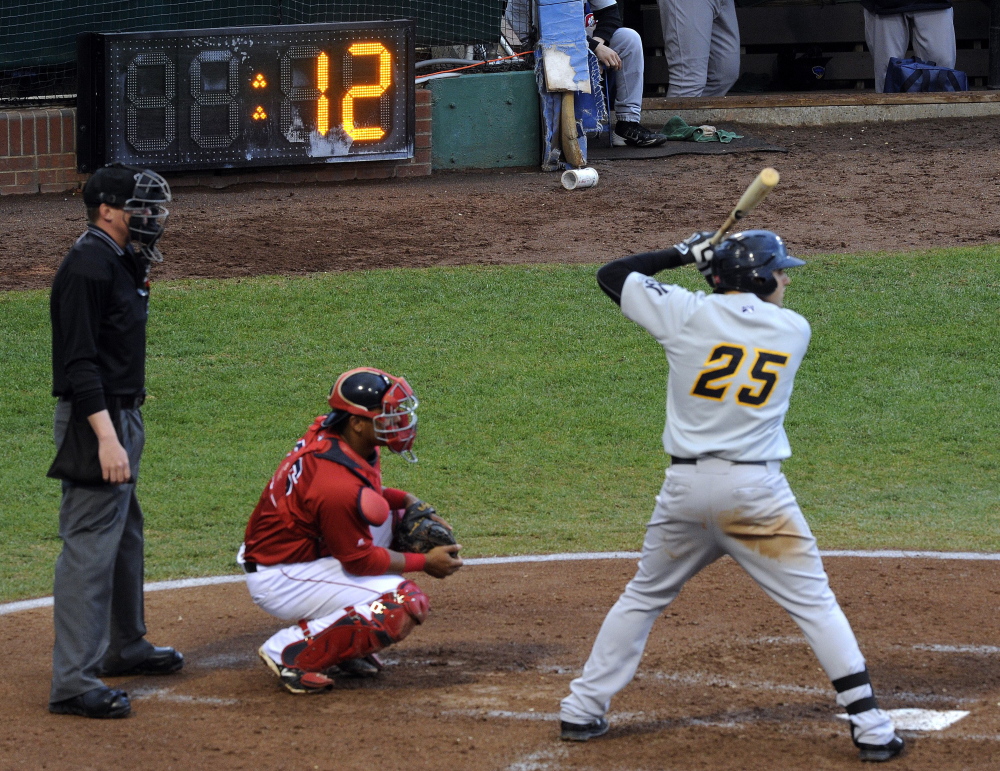Baseball fans at Hadlock Field did not get to cheer a winning team this season.
But they did get to watch faster games.
After baseball executives decided to tinker with the timeless tradition of their game, pitch clocks were installed this year in every minor league ballpark at the Triple-A and Double-A level. It was an edict from Major League Baseball, which wanted to speed up the pace of play.
The clocks appeared to have done their job, according to data from Minor League Baseball. The average nine-inning game in Triple-A and Double-A finished 12 minutes faster than in 2014.
The International League cut the most from its average game time – 16 minutes. The Eastern League featured the quickest games – 2 hours and 38 minutes, down from 2:50 last year.
At Hadlock, Portland Sea Dogs games averaged 2:43 – 3 minutes faster than last year – even though this year’s team won 35 fewer games and often batted in the bottom of the ninth inning.
“I liked the pitch clock,” said Sea Dogs pitching coach Kevin Walker. “I found it kept the pace of the game going.”
SEA DOGS PENALIZED FIVE TIMES
Pitchers had 20 seconds from one pitch to make their next one. Conversely, batters had to be ready for the pitchers.
The amount of time for pitching changes and the warm-ups between innings also was regulated.
Pitch clock violations resulted in a strike (for a batter violation) or a ball (if the pitcher was at fault). After a grace period in April, when only warnings were issued, violations were recorded from May through Labor Day.
Minor League Baseball has not compiled all of its data yet. The Eastern League reported 49 violations – 28 by pitchers and 21 by batters.
Two Sea Dogs batters (Blake Tekotte and Jantzen Witte) each received a one-strike penalty, and three Portland pitchers were penalized with a ball added to the count (Simon Mercedes, Justin Haley and Luis Diaz).
Other Sea Dogs already worked fast and never had to worry about the clock.
“It hasn’t affected me one bit,” pitcher Mike McCarthy said. “It bothered a few guys early on, especially during that grace period. But they sort of figured it out.”
Portland catcher Tim Roberson said the clock “was just an extra thing you had to pay attention to. There were a few times during the year that we had to call time or have a pitcher step off (the mound) to reset it.”
As a batter, Roberson said the clock was not confining, especially since it was turned off after foul balls.
“You could still do your same routine,” he said.
IN MAJOR LEAGUES, SOME RESISTANCE
The oft-heard complaint about baseball is that the game drags on, especially with pitchers stalling on the mound and with batters performing routines, such as adjusting their batting gloves, between every pitch.
That complaint is especially heard at major league games, where the average game took a record 3:02 last year.
Major League Baseball needs consent from the players union to implement a pitch clock in the big leagues.
Tony Clark, the union’s executive director, didn’t sound enthusiastic when he spoke to reporters during the All-Star break.
“The idea that a particular rule in Double-A, or Triple-A, or Single A – because of how it worked in the system there – means it would automatically work in the big leagues is not true,” Clark said, according to the New York Post.
“Any considerations that happen anywhere outside the big leagues, particularly ones that are going to dramatically, dramatically affect the game that is being played between the lines, is a very dangerous proposition to make,” he said.
Major League Baseball, with the union’s blessing, did implement a few rules before the 2015 season, mandating that a player keep one foot in the batter’s box; a maximum time of 2 minutes, 25 seconds for breaks between innings and relief pitcher warm-ups; and a prompt start of play after television commercial breaks.
The penalties for infractions were supposed to be warnings and eventually fines. But after a month into the 2015 season, games were already faster – by an average of 8 minutes, down to 2:54 – so Major League Baseball announced it would not issue fines.
At the minor league level, front-office staffs had to be aware of taking too much time for promotions between innings.
The Sea Dogs did not have a problem with it, said General Manager Geoff Iacuessa.
“We had 2 minutes and we always try for 90 seconds (for promotions),” Iacuessa said. “That gave us extra time if things went awry.”
So if a child, while racing Slugger the mascot around the bases, got excited and ran into the outfield, the Sea Dogs staff had time to retrieve the lad and still get off the field.
HELPING PITCHERS STAY IN RHYTHM
Between the lines, the players – especially the pitchers – were performing at a pace the Red Sox want for their young prospects.
“We talk about pitching with tempo and pitching with rhythm,” said Walker, the pitching coach. “So for us, it doesn’t hinder us at all. It actually helps us … and it keeps the game moving.”
At Hadlock Field, Sea Dogs games took 5 minutes longer (2:43) than the league average in 2015. Among the 12 Eastern League teams, only Richmond’s home games took as long.
But this was also the least successful team in Sea Dogs history (53-89). Pitchers had less control (throwing more pitches) and fielders less talent (making more errors).
Plus, the home team was usually losing and therefore batting in the ninth inning. So home games, including a 3:55 marathon on Sept. 5, took longer than the league average.
But did the pitch clock help?
Consider that the 2014 Sea Dogs were the best in franchise history (88-54). They pitched better, fielded better and usually did not bat in the ninth. Yet the 2014 home games still took 3 minutes longer than games this season.
“I think it helped,” Iacuessa said.
Send questions/comments to the editors.





Success. Please wait for the page to reload. If the page does not reload within 5 seconds, please refresh the page.
Enter your email and password to access comments.
Hi, to comment on stories you must . This profile is in addition to your subscription and website login.
Already have a commenting profile? .
Invalid username/password.
Please check your email to confirm and complete your registration.
Only subscribers are eligible to post comments. Please subscribe or login first for digital access. Here’s why.
Use the form below to reset your password. When you've submitted your account email, we will send an email with a reset code.